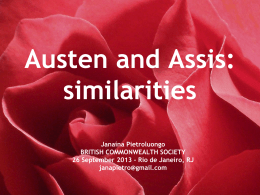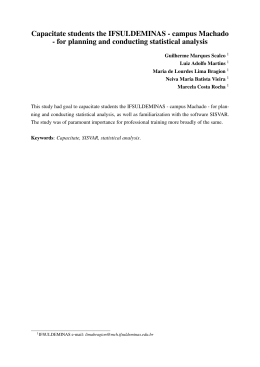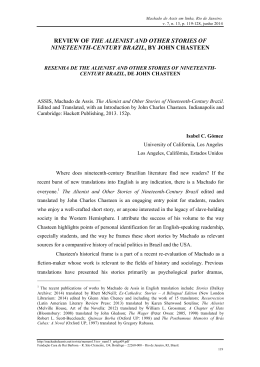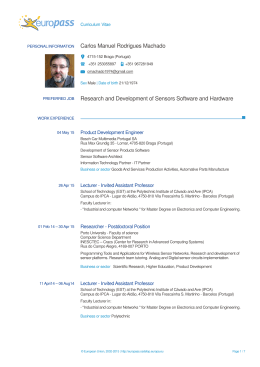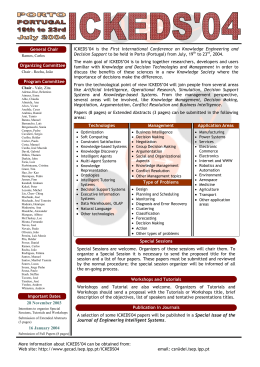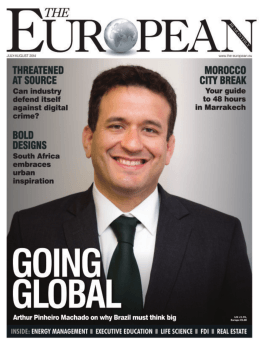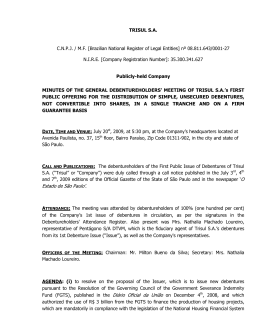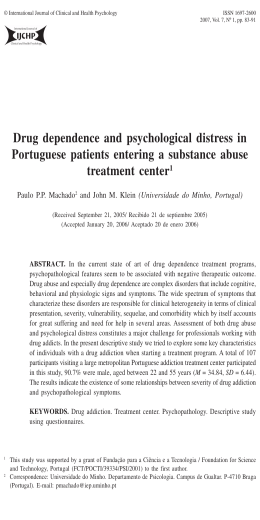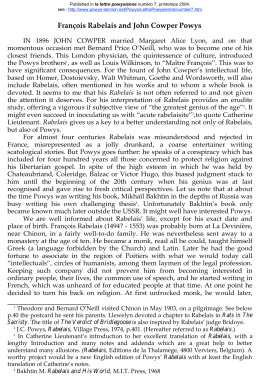Machado de Assis and the intertextuality of british humor, p.25 - p. 38 MACHADO DE ASSIS AND THE INTERTEXTUALITY OF BRITISH HUMOUR William Valentine Redmond (CES-JF) ABSTRACT It has become traditional to say that the British humourists, especially Shakespeare, Swift, Sterne, Lamb, Thackeray and Dickens influenced Machado de Assis. But it was the critic Eugênio Gomes who showed with precision the sublety and excellent taste of Machado obtained through this influence. With our contemporary approaches , it becomes interesting to question the idea of influence and examine in the light of intertextuality this contact of humour between the works of Machado and those of these five great figures of English Literature. Keywords: Humour. Machado de Assis. Intertextuality. English Literature. RESUMO Tornou-se uma tradição afirmar que os humoristas britânicos, especialmente Shakespeare, Swift, Sterne, Lamb, Thackeray e Dickens, influenciaram Machado de Assis. Mas foi o crítico Eugênio Gomes que provou, com precisão, a sutileza e o bom gosto de Machado. Dentro de uma nova abordagem, torna-se interessante questionar essa idéia de influência e examinar, à luz da intertextualidade, esse contato do humor entre as obras de Machado e dessas cinco grande figuras da Literatura Inglesa. Palavras-chave: Humor. Machado de Assis. Intertextualidade. Literatura Inglesa. What is said here about the intertextuality of Machdo de Assis and the English humourists stands or falls on the skill of Machado as a competent reader of the English classics. In order to understand the excellence of irony in a text in a foreign language, it is necessary to have proficiency in the reading skills and this level is often one of the last things that the reader achieves in his or her 25 Juiz de Fora, v. 7, n. 14, jul./dez. 2008 William Valentine Redmond competence of a foreign language. Most writers seem to take it for granted that Machado de Assis was more than competent in his knowledge of English. Eugenio Gomes in his excellent books Shakespeare em Brasil and Leituras inglesas examines with great insight what he calls the influences of the great English writers in his work. The books offer an excellent understanding and show deep research into both the works of Machado and the works of the English classic writers. But no hard proof is often to show this competence of Machado de Assis and it would seem convenient this year when we commemorate the centenary of his death to examine the facts before proceeding to a few reflections of the intertextuality of irony of Machado and the English humorists. Sebastião Jorge gives us the following information on the knowledge of English and other languages of Machado de Assis: O esforço e a sorte o acompanharam. Estava no lugar e na hora certa em determinados momentos, na companhia de pessoas influentes, o que o ajudou a subir os degraus da fama. Como aprendiz de tipógrafo, encontrou como chefe, na Tipografia Nacional, Manuel Antônio de Almeida, autor de Memórias de um sargento de milícias. Autodidata, teve como professor o padre Antônio José da Silveira Sarmento, que lhe deu aulas sem cobrar nada. Ingressou no quadro de caixeiros da livraria de Paula Brito, que fazia poesias, e terminou como revisor de um livro do chefe. Por esse tempo, com o conhecimento de inglês e francês, auxiliava Charles de Ribeyrolles na tradução de O Brasil pitoresco. Traduziu, ainda, os clássicos da literatura, como Victor Hugo (Trabalhadores do mar) e Edgar Allan Poe (O corvo) (JORGE, 2008). The same ideas are repeated in a centenial article on the homepage of the Federal University of Minas Gerais: De origem humilde, Machado de Assis era mulato, descendente de portugueses e de escravos alforriados. Nasceu em 1839, no Rio de Janeiro, e poucas vezes deixou a cidade. Gago e epilético, órfão de mãe, foi criado pela madrasta que o empregou como vendedor de doces na escola em que trabalhava. Essa experiência foi fundamental para o escritor: mesmo sem estar regularmente matriculado, ele assistia às aulas nos momentos em que não 26 Verbo de Minas: letras Machado de Assis and the intertextuality of british humor, p.25 - p. 38 estava trabalhando. O contato com os professores e com os livros acendeu no jovem o gosto pelo conhecimento e pela leitura, alimentando o espírito daquele que se tornaria um intelectual autodidata. Machado de Assis – que aprendeu francês com um padeiro parisiense de quem era amigo – estudou inglês e alemão sozinho e, mais tarde, se tornou tradutor de obras literárias: é dele a primeira versão brasileira do poema O Corvo de Edgar Allan Poe e do romance Os Trabalhadores do Mar de Vitor Hugo. Ainda jovem, Machado de Assis passa a trabalhar como tipógrafo na Imprensa Nacional. Nesse período, começa a publicar crônicas e contos em revistas e jornais cariocas, tornando-se reconhecido por intelectuais de peso, como Manuel Antônio de Almeida – autor do célebre romance Memórias de um sargento de milícias, importante marco da literatura brasileira do século XIX – e José de Alencar, à época, o maior escritor brasileiro vivo (ALMEIDA, 2008). The free encylopeidia Wikipedia repeats the ideas but goes further: Machado de Assis could speak English fluently and translated many works of William Shakespeare and other English writers into Portuguese. His work contains numerous allusions to Shakespearean plays, John Milton and influences from Sterne and Meredith de Assis (Disponível em: http://en.wikipedia.org/wiki/ Joaquim_Maria_Machado_d_Assis. Acesso em: dez. 2008). The article offers no references to these translations of Shakespeare. It might seem that to affirm a reading competence based exclusively on the translation of “The raven” of Edgar Allan Poe is not altogether convincing. Any professor who has worked with graduate or post graduation translation students would have noticed that the results of translation exercises are often not linked to the knowledge of the language. Having gone through the meaning of the poem in a lockstep activity, often the students who were outstanding in the perception of the meaning and the ambiguity of the text, did not succeed in the translation exercise, while the weaker English student offered excellent translations. In a recent congress, it was suggested that Machado de Assis was not just a close friend of the Alencar family but that the relationship between Mrs. Alencar, an English descendant lady, and Machado were very intimate. Besides suggesting that the son of Mrs Alencar, Mário de Alencar, might have been a 27 Juiz de Fora, v. 7, n. 14, jul./dez. 2008 William Valentine Redmond result of this intimacy. Iit was also suggested that Machado would have been helped by Mrs Alencar in his translation of “The raven” by explaining the meaning and the intricate rhythms of the original text of Poe. Following a French and British attitude to the private life of public figures at times forgotten by some of our critics, it would seem prudent to ignore such literary gossip during the centenary celebrations and concentrate on the qualities which made Machado the great novelists of Brazil and one of the great novelists of world literature. But this point, avoiding the implications of intimacy and looking only to friendship, could explain a Machado with little knowledge of English could have made such an excellent translation of the Raven: by itself, this is not sufficient to prove Machado’s knowledge of English. But we have some definite proof on the subject offered from Bagby, the American critic who dedicated himself to the study and the translation of the texts of Machado. He offers first information about the personal library of Machado. He tells us that regarding Assis’ knowledge of English, Massa points to his sizeable collection of classical and contemporary English works, including nine books on Macaulay, twenty-four on Shakespeare, and some thirty on Dickens, to name some of the more representative. In addition, he owned at least a dozen books on United States literature which reflect his interest in and preoccupation with Longfellow and Poe. It is also known that there was an excellent copy of Tristam Shandy in English. This number may not have told us the whole truth since it is necessary to add that, the day after Assis died some two hundred volumes of his personal library were given away to friends and have never been located. Many others lay and rotted in a garage before they could be identified and categorized. This information added up shows that Machado read the English texts in the original and the size of his English library portrays his ability in the reading of English. Helen Caldwell also agrees with this argument. She affirms that Machado de Assis read the English very well, and believes that he learned most of what he knew in his late twenties, between the years 1867 and 1870, in three years of intensive and formal study. Professor Caldwell’s conviction that Assis both read and translated English with proficiency does not prove to her though that Assis could converse in English or write it with any degree of competence. Her proof of his proficiency is based almost entirely on Machado’s literary quotations and 28 Verbo de Minas: letras Machado de Assis and the intertextuality of british humor, p.25 - p. 38 borrowings from English literature and from texts in English translating Greek literature. But her observations are another sound piece of evidence for the competence of Machado de Assis. According to Massa, the French critic of Machado de Assis, it is possible that Machado studied English before the age of eighteen, taking into account the contact he might have had with the English-speaking population of Rio, particularly in business circles. There is some evidence according to Massa that Machado studied conversational English. He may have had English read to him by someone so that he could practice comprehension; he may also have read aloud to himself. However, the main point from all this information is that it seems unlikely that one could have read and comprehended thoroughly such masterpieces of prose style as Shakespeare’s plays, if he were not proficient in the reading skill. The understanding of tone, feeling, and subtle nuances of the language of Shakespeare and the complex rhetoric of English philosophy books, also found in his library, which Assis demonstrated would demand more knowledge than is required to pass the foreign language reading requirement for advanced post graduation studies in an English speaking country. And he did, after all, understand it well enough to translate Charles Dickins’ Oliver Twist into Portuguese, a translation which was printed piecemeal in the Jornal da Tarde of Rio de Janeiro during the year 1870. We must agree then with the general conclusion of Bagby. We do know that Machado de Assis studied, read, and was interested in foreign languages during his childhood, youth, and formative years, and he agrees with Massa that this knowledge of the English language is perhaps more important than all the others. Eugenio Gomes finishes an essay in comparative Literature with the statement that: It was good that the sarcasm of Swift was tempered with other influences (influxos is the word) such as that of Sterne and Lamb and others positive benefits such as those of Thackeray and Dickens. All these contributed in some way to giving a characteristic, somewhat eccentric one can say, to the work of his maturity, lessening the effects of the sardonism of Swift and a certain macabre humour that we can attribute to Shakespeare (GOMES, 2000, p.268). 29 Juiz de Fora, v. 7, n. 14, jul./dez. 2008 William Valentine Redmond He ends by affirming “as to the extent of the influence of each one, the topic needs comparisons and the subject escapes me” (GOMES, 2000, p.268). Let me first say that we must read this text with our modern views on “influences”. They do not exist. But since every person is incapable of seeing the ideology of his time. Eugenio Gomes followed the line of thought of his period and talked of influences and “influxos” while we now talk of intertextuality. Maybe we could speak of influence in the modern sense of Bloom. Machado admired the humour of the English writers but wanted to kill them by going beyond them, producing a piece of literature that was superior to theirs and so marking his freedom from them. 1 MACHADO AND DICKENS John Middleton Murry wrote that Dickens’s “comic vision was the fiercest that has ever been in English literature, so savage as to be sometimes all but unbearable” (MURRAY, 1922, p. 11b). Although it contradicts the received notions about Dickens’s genial gaiety, it would seem that Murry’s statement is accurate. Not every example of Dickens’s humour is as potentially vicious as that evoked in the quarrel between Mrs. Gamp and Betsey Prig, the page Murry refers to, but anyone who examines the basis of laughter in the line of sex-starved women that runs through Rachael Wardle, Sally Brass, Miggs, Charity Pecksniff, Mrs. Skewton, to Lady Tippins, or in the alternate line of henpecked husbands from Mr. Pott, Mr. Bumble, Sampson Brass, Gabriel Varden, Mr. Chillip, to Rumty Wilfer will not consider this humour, at least, very genial - certainly not in its appeals. Linked to the savagery of some of Dickens’s humour is the fact that it is often dark to the point of being grotesque. This subject has often been discussed and in any case is better to discuss it in relation to individual novels. The important point is that Dickens often asks us to laugh at the very subjects he is, in other parts of the novel, asking us to sympathize or be angry with: death, loneliness, improvidence, rigidity, spontaneity, cruelty. Dickens confronts us, time and again, with these contradictory lures and, often, uses our alternate responses to intensify our relationship to his principal appeals. Ruskin’s famous statement, “I believe Dickens to be as little understood as Cervantes, and almost as mischievous” (NEILSEN, 1998, p. 298) is suggestive here of the subtlety and 30 Verbo de Minas: letras Machado de Assis and the intertextuality of british humor, p.25 - p. 38 darkness of Dickens’s humour. The ambiguity with which he mixes the funny, terrifying, and pathetic in his villains is a case in point. Three quotations might be used to illustrate this savage humour of Dickens: “Here’s the rule for bargains: ‘’Do other men, for they would do you. That’s the true business precept” (DICKENS, 1967, p. 220). The quotation, of course, has its bite because of the play on the biblical quotation about doing onto others. About married life, he says: When you’re a married man, Samivel, you’ll understand a good many things as you don’t understand now; but whether it’s worth while, going through so much, to learn so little, as the charity-boy said when he got to the end of the alphabet, is a matter o taste (DICKENS, 1967, p. 284). Finally, he makes this statement about a lady’s appearance: “You might, from your appearance, be the wife of Lucifer” (DICKENS, 1967, p. 994.) It would seem that the aim of the humour of Dickens is the same as that of all the rest of his writing. Dickens maintained that society could be improved not by the politics of a government nor by the efficient rule of an administration, but by the generosity of the rich philanthropists of society. His humour is political and an instrument of political change and reform. The humour of Machado is not that of this kind of an insider. He is an outsider, for reasons of his origins, his culture and the place of Brazilians in the reality of a colonised country. The originality of Brazilian humour, as Humberto de Campos affirms from another perspective, is to be found in the shock of the Brazilian capriciousness with established conventions and traditional moral and artistic formulas. Campos locates the source of national humour in the mechanism of a new-world reality characterized by gaps and differences of perspective that occur when received traditions are placed in a Brazilian context. Let us take this quotation from Primas de Sapucaia: “Palavra puxa palavra, uma idéia traz outra, e assim se faz um livro, um governo, ou uma revolução, alguns dizem que assim é que a natureza compôs as suas espécies” (ASSIS, 2006, p. 89.). Here Machado is an outside observer of literature, of government and of reform. There is no savage desire to change society from the inside, just to observe it. 31 Juiz de Fora, v. 7, n. 14, jul./dez. 2008 William Valentine Redmond 2 MACHADO AND STERNE Sterne’s humour is on the other hand subversive and comes from a man who is an outsider, as is fitting for an Irish protestant, looking on, from a distance, the social, political and religious realities of his times. The position of Laurence Sterne is unmistakably among prose writers of a subversive class of humour. It is by his humour - his humour of character, his dramatic as distinct from his critical descriptive that he lives and will live. In Tristram Shandy, as in the Sermons, there is a wealth of wit, and considerably more than a sufficiency of humorous reflection and innuendo; but it is the actors in his almost plotless drama who have established their creator in his niche of fame. We cannot, indeed, be certain that what has given him his hold upon posterity is what gave him his popularity in his own days. On the contrary, it is, perhaps, more probable that he owed his first success with the public of his day to those eccentricities which are for us a little too consciously eccentric - those artifices which fail a little too conspicuously in the ars celandi artem. However these tricks may have pleased in days when such tricks were new, they much more often weary than entertain us nowadays; and it would seem that many a man whose delight in the Corporal and his master, in Bridget and her mistress, is as fresh as ever, declines to accompany their creator in those perpetual digressions into nonsense or semi-nonsense the fashion of which Sterne borrowed from Rabelais, without Rabelais’s excuse for adopting it. To us of this day the real charm and distinction of the book is due not only to the marvellous combination of vigour and subtlety in its portrayal of character, but also to the purity and delicacy of its humour. Let us illustrate also the humour of Sterne with three quotations: “People who overly take care of their health are like misers. They hoard up a treasure which they never enjoy” (STERNE, 2007, p. 641). Again he observes: “For every ten jokes you acquire a hundred enemies” (STERNE, 2007, p. 543) and the slier comment made in the Sentimental journey: “There are worse occupations in this world than feeling a woman’s pulse” (STERNE, 2007, p. 587). Sterne’s humour is not political, it is not critical of society. It is about sly observations of the behaviour of humanity. There is an element of this type of humour in such observations of Machado as: “Importuna coisa é a felicidade alheia quando somos vítima de algum infortúnio” (ASSIS, 2007, p. 14) and again 32 Verbo de Minas: letras Machado de Assis and the intertextuality of british humor, p.25 - p. 38 in the bitter crack “As melhores mulheres pertencem aos homens mais atrevidos” (ASSIS, 2008, p. 87). There is certainly a Sterniam strain in Machado’s humour. 3 MACHADO AND LAMB The humour of Lamb on the other hand is much more whimisical, without that bit seen in either Dickens or Sterne. From 1820 through 1825 Lamb contributed a series of essays to the London Magazine which were greatly popular. Writing under the pseudonym Elia, these essays, like his letters, are intimate revelations of Lamb’s own thoughts, his emotions, and his experiences of literature and life. He touches on few disturbing subjects. He prefers instead to look to the past for a sense of calm, stability, and changelessness. Yet beneath the wit, humour, and humanity of such essays as “A dissertation upon roast pig”, “Witches and other night-fears,” and “Dream children,” there is a gentle nostalgia and melancholy. There is a bittersweet tone to the humour that remains the hallmark of Lamb’s style. We can see the whimisical humour of Lamb in three quotations: “The greatest pleasure I know, is to do a good action by stealth, and to have it found out by accident” (LAMB, 1935, p. 63). The quotation on poor relations is more bitter than sweet: A poor relation is the most irrelevant thing in nature, a piece of impertinent correspondence, an odious approximation, a haunting conscience, a preposterous shadow, lengthening in the noon-tide of our prosperity. He is known by his knock (LAMB, 1935, p. 68). But there is gentleness in the other observation: “T’is the privilege of friendship to talk nonsense, and have her nonsense respected” (LAMB, 1935, p.98). This is humour coming from a charming structuring of the phrase that comments on the ironical realities of human relationships. Machado has some similiar type of obervations: “Alguma coisa escapa ao naufrágio das ilusões” (ASSIS, 2000, p.102) and again “A arte de viver consiste em tirar o maior bem do maior mal” (ASSIS, 2000, p. 15). Even the advice for after meal discourses has a pragmatic, ironic ring: “Sentenças latinas, ditos históricos, versos célebres, 33 Juiz de Fora, v. 7, n. 14, jul./dez. 2008 William Valentine Redmond brocardos jurídicos, máximas, é de bom aviso trazê-los contigo para os discursos de sobremesa, de felicitação ou de agradecimento” (ASSIS, 2005, p. 39). 4 MACHADO AND SWIFT Irony, Ire, Ireland: this trio of words explains the humour of Jonathan Swift; although he is said to have born the most dour countenance in history, his wit could make readers laugh through his bile. The satire of Swift threw a political punch that was generally aimed at the jaw of English establishment. Being an Irishman, Swift relentlessly questioned English government and disparaged English character. But he also employed self-ridicule as a deft tactic in the ambush of the imperialist interlopers. He raised consciousness not only about Ireland’s maltreatment, but also about slavery and the lack of liberty in general. Swift placed his bile at the service of positive social ends; for one who claimed to hate mankind on the whole, he rallied viciously and vigorously for its rights. Voltaire wrote “The more I read your works, the more I am ashamed of mine” (TORREY, 1929, p. 307) to that great champion of free speech, in a letter to Swift. Swift’s writing does indeed insist upon an unstinting honesty. He dealt with most of the important political issues of his time in Gulliver’s travels (1726), which was (and often still is) read as a children’s tale. The fantastical societies and characters that Gulliver meets are delightful and inventive, but also represent the most scathing allegories for social pretensions and human behaviours. The book’s nuances are too sophisticated for many adults, let alone children, but its humour and clarity of speech do make it accessible to all readers on some level. Swift’s caustic humour is devastating. See for example these three quotations as follow. “I never saw, heard, nor read, that the clergy were beloved in any nation where Christianity was the religion of the country. Nothing can render them popular, but some degree of persecution” (SWIFT, 1965, p. 59). Again he comments: “She wears her clothes as if they were thrown on with a pitch fork” (SWIFT, 1965, p. 111) and the advice to the Irish “:”Burn everything British, except their coal” (apud THOM; WALSH, 2008). Contrast this with the quotations of Machado: “O ridículo é uma espécie de lastro da alma quando ela entra no mar da vida; algumas fazem toda a navegação sem outra espécie de carregamento” (ASSIS, 2006, p. 142) or again “Não há decepções possíveis para um viajante, que apenas vê de passagem o 34 Verbo de Minas: letras Machado de Assis and the intertextuality of british humor, p.25 - p. 38 lado belo da natureza humana e não ganha tempo de conhecer-lhe o lado feio” (ASSIS, 2006, p. 645). There is a sureness about the observations but there is no element of caustic hostile humour of Swift. 5 MACHADO AND THACKERAY Thackeray in his reflections saw the writer as serving a necessary function: to raise the consciousness of his readers. He came to see himself as a satiricalmoralist, with a responsibility both to amuse and to teach: “A few years ago I should have sneered at the idea of setting up as a teacher at all... but I have got to believe in the business and in my other things since then. And our profession seems to me as serious as the Parson’s own” (apud JADMIN, 1992, p. 663). He aimed not only to expose the false values and practices of society and its institutions and to portray the callous selfish behavior of people, but also to affirm the value of truth, justice, and kindness. This double aim is reflected in his description of himself as satiric and kind: “under the mask satirical, there walks about a sentimental gentleman who means not unkindly to any mortal person” (THACKERAY, 2001, p. 46). Though Thackeray set his novel a generation earlier, he was really writing about his own society (indicatively he even used contemporary clothing in his illustrations for the novel). Thackeray saw how capitalism and imperialism with their emphasis on wealth, material goods, and ostentation had corrupted society and how the inherited social order and institutions, including the aristocracy, the church, the arm forces, and the foreign service, regarded only family, rank, power, and appearance. These values morally crippled and emotionally bankrupted every social class from servants through the middle classes to the aristocracy. High and low, individuals were selfish and incapable of loving. “We must lift up our voices about these and howl to a congregation of fools: so much as least has been my endeavour” (THACKERAY, 2001, p. 114). Here are three quotations to show the tonality of Thackeray’s humour. “If a man character is to be abused there’s nobody like a relative to do the business” (THACKERAY, 2001, p. 453). Again, his comments about the drunkard as he returns to consciousness: ”I never know whether to pity or congratulate a man on coming to his senses” (THACKERAY, 2001, p. 78) or even the statement: “It is best to love wisely, no doubt; but to love foolishly is better than not to be able 35 Juiz de Fora, v. 7, n. 14, jul./dez. 2008 William Valentine Redmond to love at all” (THACKERAY, 2001, p. 676). The social criticism of the following observation is a little more vicious: “Whenever he met a great man he grovelled before him, and my-lorded him as only a free-born Briton can do” (THACKERAY, 2001, p. 778). There is little moral fervour in Machado and none of the desire to change society through literture. When he writes “Porque não há raciocínio nem documento que nos explique melhor a intenção de um ato do que o próprio autor do ato” (ASSIS, 2005, p. 85) he is observing human behaviour. When he states “A vida é uma enorme loteria; os prêmios são poucos, os malogrados inúmeros, e com os suspiros de uma geração é que se amassam as esperanças de outra” (ASSIS, 2005, p. 33) and again “Meu amigo, a imaginação e o espírito têm limites; a não ser a famosa botelha dos saltimbancos e a credulidade dos homens, nada conheço inesgotável debaixo do sol” (ASSIS, 2005, p. 34). Here we have a sad tale of humanity, but the texts have no intention of preaching social change or undermining human social structures. Machado is indeed very different. CONCLUSION Gomes mentions, besides Sterne, Lamb, Dickens, Thackeray and Swift, also Shakespeare, but prudence warns me off any attempt to compare the dramatist with the novelist and short story writer, a Renaissance genius with bruxo do Cosme Velho. But undoubtedly, Machado de Assis has an ability to use humour to entertain and call attention in his works. His structuring, his perception of reality and his grace of language qualify him to stand among the great humourists of world literature and places him closer to the outside critical observers, the Irish writer Sterne and the quiet Romantic Lamb than the English humourists bent on social improvement. 36 Verbo de Minas: letras Machado de Assis and the intertextuality of british humor, p.25 - p. 38 REFERENCES ALMEIDA, Roberto. Machado de Assis, cem anos depois. Disponível em: <www.fae.ufmg.br/Ceale/menu/abas/noticias/2008 ). Acesso em: 7 set. 2008. ASSIS, Machado. Obra completa. Rio de Janeiro: Nova Aguilar, 2006. 3 v. ______. A parasita azul. In: ______. Histórias da meia-noite. São Paulo: Martins Fontes, 2007. p. 10-21. ______. Primas de Sapucaia. In: ______. Histórias sem data. São Paulo: Martins Fontes, 2005. ______. Toda poesia de Machado de Assis. Rio de Janeiro: Record, 2008. ______. Iaiá Garcia. Rio de Janeiro:Atica, 2000. ______. Papéis avulsos. São Paulo: Martins Fontes, 2005. ______.Contos fluminenses. São Paulo: Martins Fontes, 2006. CAMPOS, Humberto de. Diário secreto. Rio de Janeiro: O Cruzeiro, 1954. GOMES, Eugênio. Machado de Assis: leituras inglesas. Belo Horizonte: UFMG, 2000. ______. Shakespeare no Brasil. Rio de Janeiro: Ministério da Educação e Cultura, Serviço de Documentação, 1961. DICKENS, Charles. Complete works of Charles Dickens. Oxford: Oxford University Press, 1967. ______. A tale of two cities. Harmondsworth: Penguin, 2003. ______. Martin Chuzzlewit. Londres: Wordsworth, 1994. ______. The Pickwick papers. Harmondsworth: Penguin, 2000. 37 Juiz de Fora, v. 7, n. 14, jul./dez. 2008 William Valentine Redmond JADMIN, Lisa. The seductiveness of female duplicity in Vanity fair. Studies in English Literature 1500-1900, Houston, v. 32, n. 4, p. 663, 1992. JORGE, Sebastião. Machado de Assis, o “bruxo” das palavras. Disponível em: <observatoriodeimprensa.com.br>. Acesso em: 22 jul. 2008. LAMB, Charles.The complete works and letters of Charles Lamb. New York: Modern Library, 1935. MASSA, Jean-Michel. La bibliothèque de Machado de Assis. Revista do Livro, Rio de Janeiro, n. 6, p. 195-238. MURRY, John Middleton. The Times, Londres, 14 jul. 1922, p. 11b. NEILSEN. Don L. F. Humour in eighteenth and nineteenth-century British Literature: a reference guide. Westport: Greenwood, 1998. STERNE, L. The life and opinions of Tristram Shandy. Harmondsworth: Penguin, 1967. STERNE, Laurence. The complete works and life of Laurence Sterne. Edited Wilbur L. Cross. London: Kessinger Publishing Company, 2007. SWIFT, Jonathan. Complete works. London: Collins, 1965. THACKERAY, William Makepeace. Complete works of William Makepeace Thackeray . London: Classic Books, 2001. THOM, R.; WALSH, B. European economic review. 2002. Disponível em: <http://www.sciencedirect.com>. Acesso em: 14 set. 2008. TORREY, Norman.L. Voltaire’s English Notebook. Modern philology, London, v. 26, n. 3, p. 307, 1929. 38 Verbo de Minas: letras
Download
